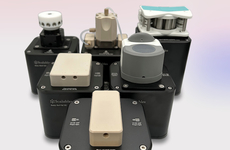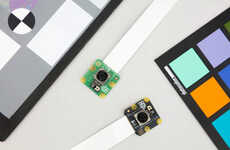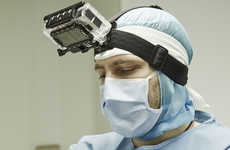
The Cambits Imaging System Allows For Convenient Scientific Imaging
Rahul Kalvapalle — February 18, 2016 — Tech
References: engineering.columbia.edu & gizmag
Cambits is a futuristic and innovative modular imaging system, developed by a team of innovators led by Shree Nayar of Columbia University and Makoto Odamaki of the Ricoh Corporation, that is designed to make it easier than ever to conduct imaging for scientific purposes.
Scientific research often requires different kinds of imaging, and the Cambits system makes it possible to devise systems out of convenient electronic building blocks rather than having to buy several cameras. The Cambits modular imaging system comprises five kinds of colorful 3D-printed plastic blocks that can be stuck to each other magnetically and be electronically linked.
Ultimately, this modular imaging system is helping to redefine the camera by coming with a modular and customizable system that can be used to capture different kinds of images.
Scientific research often requires different kinds of imaging, and the Cambits system makes it possible to devise systems out of convenient electronic building blocks rather than having to buy several cameras. The Cambits modular imaging system comprises five kinds of colorful 3D-printed plastic blocks that can be stuck to each other magnetically and be electronically linked.
Ultimately, this modular imaging system is helping to redefine the camera by coming with a modular and customizable system that can be used to capture different kinds of images.
Trend Themes
1. Modular Imaging Systems - The Cambits Imaging System is an example of a modular imaging system that allows for customizable and versatile scientific imaging.
2. Convenient Electronic Building Blocks - The Cambits modular imaging system utilizes colorful 3D-printed plastic blocks that can be magnetically stuck together, providing a convenient and flexible solution for scientific imaging.
3. Redefined Camera Technology - The Cambits imaging system is redefining traditional camera technology by offering a modular and customizable approach to capturing various types of images for scientific purposes.
Industry Implications
1. Scientific Research - The Cambits modular imaging system provides a disruptive innovation opportunity in the field of scientific research, enabling more convenient and efficient imaging processes.
2. Photography and Imaging - The development of modular imaging systems like Cambits presents an exciting innovation opportunity for the photography and imaging industry, offering customizable and versatile solutions for capturing images.
3. Electronics and Consumer Technology - The Cambits modular imaging system introduces a disruptive innovation in the electronics and consumer technology sector, providing a new approach to camera technology with its modular and customizable design.
1.8
Score
Popularity
Activity
Freshness















